- Home
- William Golding
Rites of Passage Page 14
Rites of Passage Read online
Page 14
“I myself,” said I swiftly, “have nothing to do with the present matter. Our captain refers to Colley.”
“The parson is it? Good God! I assure you it doesn’t matter to me at my time of life. Let them enjoy themselves I said—on board I said it—or did I?”
Mr Brocklebank hiccupped. A thin streak of wine ran down his chin. His eyes wandered.
“We need your medical experience,” said the captain, his growls only just below the surface, but in what for him was a conciliatory tone. “We have none ourselves and look to you—”
“I have none either,” said Mr Brocklebank. “Garçon, another glass!”
“Mr Talbot said—”
“I looked round you see but I said, Wilmot, I said, this anatomy is not for you. No indeed, you have not the stomach for it. In fact as I said at the time, I abandoned Aesculapius for the Muse. Have I not said so to you, Mr Talbot?”
“You have so, sir. On at least two occasions. I have no doubt the captain will accept your excuses.”
“No, no,” said the captain irritably. “However little the gentleman’s experience, we must profit by it.”
“Profit,” said Brocklebank. “There is more profit in the Muse than in the other thing. I should be a rich man now had not the warmth of my constitution, an attachment more than usually firm to the Sex and the opportunities for excess forced on my nature by the shocking corruption of English Society—”
“I could not abide doctoring,” said Oldmeadow. “All those corpses, good God!”
“Just so, sir. I prefer to keep reminders of mortality at arm’s length. Did you know I was first in the field after the death of Lord Nelson with a lithograph portraying the happy occasion?”
“You were not present!”
“Arm’s length, sir. Neither was any other artist. I must admit to you freely that I believed at the time that Lord Nelson had expired on deck.”
“Brocklebank,” cried I, “I have seen it! There is a copy on the wall in the tap of the Dog and Gun! How the devil did that whole crowd of young officers contrive to be kneeling round Lord Nelson in attitudes of sorrow and devotion at the hottest moment of the action?”
Another thin trickle of wine ran down the man’s chin.
“You are confusing art with actuality, sir.”
“It looked plain silly to me, sir.”
“It has sold very well indeed, Mr Talbot. I cannot conceal from you that without the continued popularity of that work I should be in Queer Street. It has at the very least allowed me to take a passage to, to wherever we are going, the name escapes me. And imagine, sir, Lord Nelson died down below in some stinking part of the bilges, I believe, with nothing to see him by but a ship’s lantern. Who in the devil is going to make a picture of that?”
“Rembrandt perhaps.”
“Ah. Rembrandt. Yes, well. At least Mr Talbot you must admire the dexterity of my management of smoke.”
“Take me with you, sir.”
“Smoke is the very devil. Did you not see it when Summers fired my gun? With broadsides a naval battle is nothing but a London Particular. So your true craftsman must tuck it away to where it does not obtrude—obtrude—”
“Like a clown.”
“Obtrude—”
“And interrupt some necessary business of the action.”
“Obtrude—captain, you don’t drink.”
The captain made another gesture with his glass, then looked round at the other three of his guests in angry frustration. But Brocklebank, his elbows now on either side of the marrow bone intended for Summers, droned on.
“I have always maintained that smoke properly handled can be of ma-material assistance. You are approached by some captain who has had the good fortune to fall in with the enemy and get off again. He comes to me as they did, after my lithograph. He has, for example, in company with another frigate and a small sloop—encountered the French and a battle has ensued—I beg your pardon! As the epitaph says, ‘Wherever you be let your wind go free for holding mine was the death of me.’ Now I ask you to imagine what would happen—and indeed my good friend, Fuseli, you know, the Shield of Achilles, and—well. Imagine!”
I drank impatiently and turned to the captain.
“I think, sir, that Mr Brocklebank—”
It was of no avail and the man drooled again without noticing.
“Imagine—who pays me? If they all pay there can be no smoke at all! Yet they must all be seen to be hotly engaged, the devil take it! They come to blows, you know!”
“Mr Brocklebank,” said the captain fretfully, “Mr Brocklebank—”
“Give me one single captain who has been successful and got his K! Then there will be no argument!”
“No,” said Oldmeadow, cawing into his collar, “no indeed!”
Mr Brocklebank eyed him truculently.
“You doubt my word, sir? Do you, because if you do, sir—”
“I, sir? Good God no, sir!”
“He will say, ‘Brocklebank,’ he will say. ‘I don’t give a tuppenny damn for me own part, but me mother, me wife and me fifteen gals require a picture of me ship at the height of the action!’ You follow? Now after I have been furnished with a copy of the gazette and had the battle described to me in minutest detail he goes off in the happy delusion that he knows what a naval battle looks like!”
The captain raised his glass. This time he emptied it at a gulp. He addressed Brocklebank in a voice which would have scared Mr Taylor from one end of the ship to the other if not farther.
“I for my part, sir, should be of his opinion!”
Mr Brocklebank, to indicate the degree of his own cleverness, tried to lay a finger cunningly on the side of his nose but missed it.
“You are wrong, sir. Were I to rely on verisimilitude—but no. Do you suppose that my client, who has paid a deposit—for you see he may be off and lose his head in a moment—”
Summers stood up.
“I am called for, sir.”
The captain, with perhaps the only glimmer of wit I have found in him, laughed aloud.
“You are fortunate, Mr Summers!”
Brocklebank noticed nothing. Indeed, I believe if we had all left him he would have continued his monologue.
“Now do you suppose the accompanying frigate is to be portrayed with an equal degree of animation? She has paid nothing! That is where smoke comes in. By the time I have done my layout she will have just fired and the smoke will have risen up round her; and as for the sloop, which will have been in the hands of some obscure lieutenant, it will be lucky to appear at all. My client’s ship on the other hand will be belching more fire than smoke and will be being attacked by all the enemy at once.”
“I could almost wish,” said I, “that the French would afford us an opportunity for invoking the good offices of your brush.”
“There’s no hope of that,” said the captain glumly, “no hope at all.”
Perhaps his tone affected Mr Brocklebank, who went through one of those extraordinarily swift transitions which are common enough among the inebriated from cheerfulness to melancholy.
“But that is never the end of it. Your client will return and the first thing he will say is that Corinna or Erato never carried her foremast stepped as far forrard as that and what is that block doing on the main brace? Why, my most successful client—apart from the late Lord Nelson if I may so describe him—as a client I mean—was even foolish enough to object to some trifling injuries I had inflicted on the accompanying frigate. He swore she had never lost her topmast, her fore topmast I think he said, for she was scarcely in cannon shot. Then he said I had shown no damage in the region of the quarterdeck of his ship, which was not accurate. He forced me to beat two gunports into one there and carry away a great deal of the rail. Then he said, ‘Could you not dash me in there, Brocklebank? I distinctly remember standin’ just by the broken rail, encouragin’ the crew and indicatin’ the enemy by wavin’ me sword towards them.’ What could I do? The cl
ient is always right, it is the artist’s first axiom. ‘The figure will be very small, Sir Sammel,’ said I. ‘That is of no consequence,’ said he. ‘You may exaggerate me a little.’ I bowed to him. ‘If I do that, Sir Sammel,’ said I, ‘it will reduce your frigate to a sloop by contrast.’ He took a turn or two up and down my studio for all the world like our captain here on the quarterdeck. ‘Well,’ said he at last, ‘you must dash me in small, then. They will know me by me cocked hat and me epaulettes. It’s of no consequence to me, Mr Brocklebank, but me good lady and me gals insist on it.’”
“Sir Sammel,” said the captain. “You did say ‘Sir Sammel’?”
“I did. Do we move on to brandy?”
“Sir Sammel. I know him. Knew him.”
“Tell us all, Captain,” said I, hoping to stem the flow. “A shipmate?”
“I was the lieutenant commanding the sloop,” said the captain moodily, “but I have not seen the picture.”
“Captain! I positively must have a description of this,” said I. “We landsmen are avid, you know, for that sort of thing!”
“Good God, the shloop! I have met the sh—the other sh—the lieutenant. Captain, you must be portrayed. We will waft away the sh—the smoke and show you in the thick of it!”
“Why so he was,” said I. “Can we believe him anywhere else? You were in the thick of it, were you not?”
Captain Anderson positively snarled.
“The thick of the battle? In a sloop? Against frigates? But Captain—Sir Sammel I suppose I must say—must have thought me in the thick of it for he bawled through his speaking trumpet, ‘Get to hell out of this, you young fool, or I’ll have you broke!’”
I raised my glass to the captain.
“I drink to you, sir. But no blind eye? No deaf ear?”
“Garçon, where is the brandy? I must limn you, Captain, at a much reduced fee. Your future career—”
Captain Anderson was crouched at the table’s head as if to spring. Both fists were clenched on it and his glass had fallen and smashed. If he had snarled before, this time he positively roared.
“Career? Don’t you understand, you damned fool? The war is nigh over and done with and we are for the beach, every man jack of us!”
There was a prolonged silence in which even Brocklebank seemed to find that something unusual had happened to him. His head sank, then jerked up and he looked round vacantly. Then his eyes focused. One by one, we turned.
Summers stood in the doorway.
“Sir. I have been with Mr Colley, sir. It is my belief the man is dead.”
Slowly, each of us rose, coming, I suppose, from a moment of furious inhospitality to another realization. I looked at the captain’s face. The red suffusion of his anger had sunk away. He was inscrutable. I saw in his face neither concern, relief, sorrow nor triumph. He might have been made of the same material as the figurehead.
He was the first to speak.
“Gentlemen. This sorry affair must end our, our meeting.”
“Of course, sir.”
“Hawkins. Have this gentleman escorted to his cabin. Mr Talbot. Mr Oldmeadow. Be good enough to view the body with Mr Summers to confirm his opinion. I myself will do so. I fear the man’s intemperance has destroyed him.”
“Intemperance, sir? A single, unlucky indulgence?”
“What do you mean, Mr Talbot?”
“You will enter it so in the log?”
Visibly, the captain controlled himself.
“That is something for me to consider in my own time, Mr Talbot.”
I bowed and said nothing. Oldmeadow and I withdrew and Brocklebank was half-carried and half-dragged behind us. The captain followed the little group that surrounded the monstrous soak. It seemed that every passenger in the ship, or at least the after part of it, was congregated in the lobby and staring silently at the door of Colley’s cabin. Many of the crew who were not on duty, and most of the emigrants, were gathered at the white line drawn across the deck and were staring at us in equal silence. I suppose there must have been some noise from the wind and the passage of the ship through the water but I, at least, was not conscious of it. The other passengers made way for us. Wheeler was standing on guard at the door of the cabin, his white puffs of hair, his bald pate and lighted face—I can find no other description for his expression of understanding all the ways and woes of the world—gave him an air of positive saintliness. When he saw the captain he bowed with the unction of an undertaker or indeed as if the mantle of poor, obsequious Colley had fallen on him. Though the work should have gone to Phillips, it was Wheeler who opened the door, then stood to one side. The captain went in. He stayed for no more than a moment, came out, motioned me to enter, then strode to the ladder and up to his own quarters. I went into the cabin with no great willingness, I can assure you! The poor man still clutched the eyebolt—still lay with his face pressed against the bolster, but the blanket had been turned back and revealed his cheek and neck. I put three hesitant fingers on his cheek and whipped them back as if they had been burned. I did not choose, indeed I did not need, to lean down and listen for the man’s breathing. I came out to Colley’s silent congregation and nodded to Mr Oldmeadow who went in, licking pale lips. He too came out quickly.
Summers turned to me.
“Well, Mr Talbot?”
“No living thing could be as cold.”
Mr Oldmeadow turned up his eyes and slid gently down the bulkhead until he was sitting on the deck. Wheeler, with an expression of holy understanding, thrust the gallant officer’s head between his knees. But now, of all inappropriate beings, who should appear but Silenus? Brocklebank, perhaps a little recovered or perhaps in some extraordinary trance of drunkenness, reeled out of his cabin and shook off the two women who were trying to restrain him. The other ladies shrieked and then were silent, caught between the two sorts of occasion. The man wore nothing but a shirt. He thrust, weaving and staggering, into Colley’s cabin and shoved Summers aside with a force that made the first lieutenant reel.
“I know you all,” he shouted, “all, all! I am an artist! The man is not dead but shleepeth! He is in a low fever and may be recovered by drink—”
I grabbed the man and pulled him away. Summers was there, too. We were mixed with Wheeler and stumbling round Oldmeadow—but really, death is death and if that is not to be treated with some seriousness—somehow we got him out into the lobby, where the ladies and gentlemen were silent again. There are some situations for which no reaction is suitable—perhaps the only one would have been for them all to retire. Somehow we got him back to the door of his hutch, he meanwhile mouthing about spirits and low fever. His women waited, silent, appalled. I was muttering in my turn.
“Come now, my good fellow, back to your bunk!”
“A low fever—”
“What the devil is a low fever? Now go in—go in, I say! Mrs Brocklebank—Miss Brocklebank, I appeal to you—for heaven’s sake—”
They did help and got the door shut on him. I turned away, just as Captain Anderson came down the ladder and into the lobby again.
“Well gentlemen?”
I answered both for Oldmeadow and myself.
“To the best of my belief, Captain Anderson, Mr Colley is dead.”
He fixed me with his little eyes.
“I heard mention of ‘a low fever’, did I not?”
Summers came out, closing the door of Colley’s cabin behind him. It was an act of curious decency. He stood, looking from the captain to me and back again. I spoke unwillingly—but what else could I say?
“It was a remark made by Mr Brocklebank who is, I fear, not wholly himself.”
I swear the captain’s cheeks creased and the twin sparks came back. He looked round the crowd of witnesses.
“Nevertheless, Mr Brocklebank has had some medical experience!”
Before I could expostulate he had spoken again and with the tyrannical accents of his service.
“Mr Summers. See that the
customary arrangements are made.”
“Aye, aye, sir.”
The captain turned and retired briskly. Summers continued in much the same accents as his captain.
“Mr Willis!”
“Sir!”
“Bring aft the sailmaker and his mate and three or four able-bodied men. You may take what men of the off-duty watch are under punishment.”
“Aye, aye, sir.”
Here was none of the pretended melancholy our professional undertakers have as their stock-in-trade! Mr Willis departed forrard at a run. The first lieutenant then addressed the assembled passengers in his customary mild accents.
“Ladies and gentlemen, you will not wish to witness what follows. May I request that the lobby be cleared? The air of the quarterdeck is to be recommended.”
Slowly the lobby cleared until Summers and I were left together with the servants. The door of Brocklebank’s hutch opened and the man stood there grotesquely naked. He spoke with ludicrous solemnity.
“Gentlemen. A low fever is the opposite of a high fever. I bid you good day.”
He was tugged backwards and reeled. The door was shut upon him. Summers then turned to me.
“You, Mr Talbot?”
“I have the captain’s request still to comply with, have I not?”
“I fancy it has ended with the poor man’s death.”
“We talked of noblesse oblige and fair play. I found myself translating the words by a single one.”
“Which is?”
“Justice.”
Summers appeared to consider. “You have decided who is to appear at the bar?”
“Have not you?”
“I? The powers of a captain—besides, sir, I have no patron.”
“Do not be so certain, Mr Summers.”
He looked at me for a moment in bewilderment. Then he caught his breath. “I—?”
But men of the crew were trotting aft towards us. Summers glanced at them, then back at me.
“May I recommend the quarterdeck?”
“A glass of brandy is more appropriate.”
I went into the passenger saloon and found Oldmeadow slumped there in a seat under the great stern window, an empty glass in his hand. He was breathing deeply and perspiring profusely. But the colour was back in his cheeks. He muttered to me.

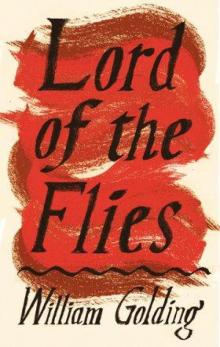 Lord of the Flies
Lord of the Flies To the Ends of the Earth
To the Ends of the Earth Free Fall
Free Fall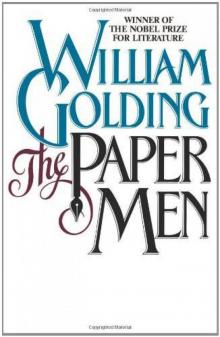 The Paper Men
The Paper Men The Spire
The Spire The Scorpion God: Three Short Novels
The Scorpion God: Three Short Novels The Inheritors
The Inheritors Darkness Visible: With an Introduction by Philip Hensher
Darkness Visible: With an Introduction by Philip Hensher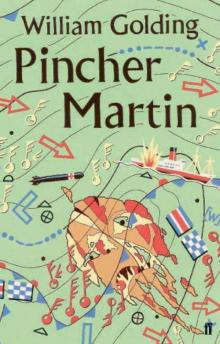 Pincher Martin
Pincher Martin The Pyramid
The Pyramid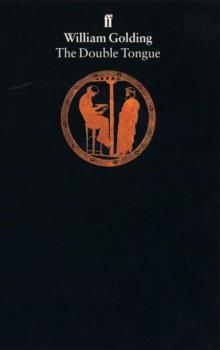 The Double Tongue
The Double Tongue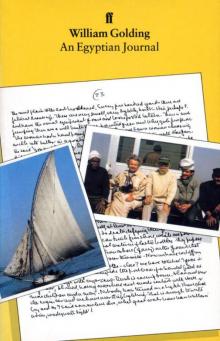 An Egyptian Journal
An Egyptian Journal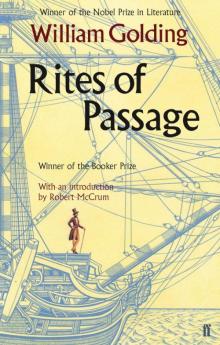 Rites of Passage
Rites of Passage Envoy Extraordinary
Envoy Extraordinary